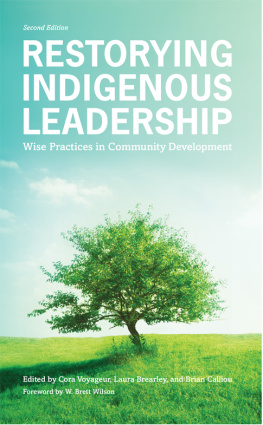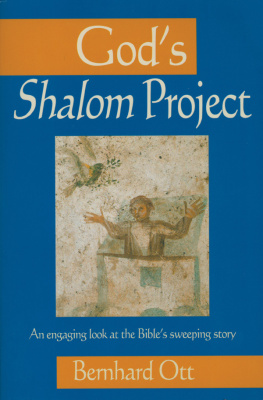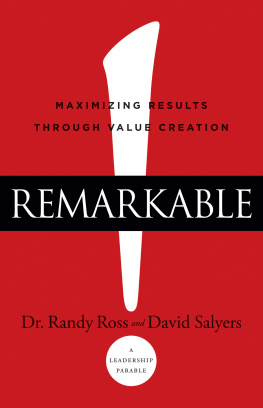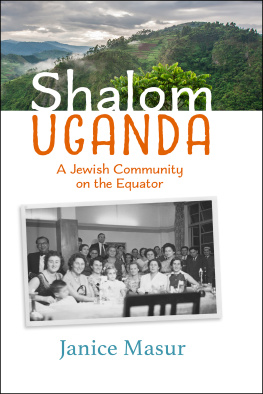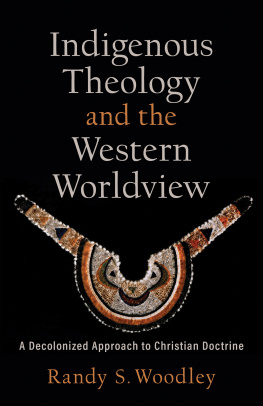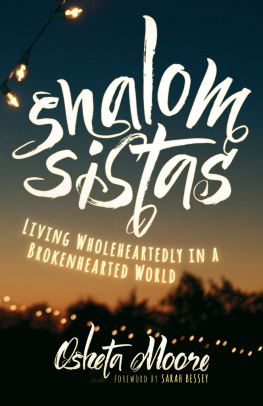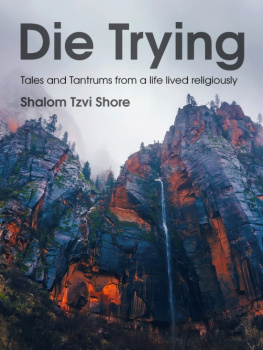Randy Woodley - Shalom and the Community of Creation: An Indigenous Vision
Here you can read online Randy Woodley - Shalom and the Community of Creation: An Indigenous Vision full text of the book (entire story) in english for free. Download pdf and epub, get meaning, cover and reviews about this ebook. year: 2012, genre: Religion. Description of the work, (preface) as well as reviews are available. Best literature library LitArk.com created for fans of good reading and offers a wide selection of genres:
Romance novel
Science fiction
Adventure
Detective
Science
History
Home and family
Prose
Art
Politics
Computer
Non-fiction
Religion
Business
Children
Humor
Choose a favorite category and find really read worthwhile books. Enjoy immersion in the world of imagination, feel the emotions of the characters or learn something new for yourself, make an fascinating discovery.
- Book:Shalom and the Community of Creation: An Indigenous Vision
- Author:
- Genre:
- Year:2012
- Rating:5 / 5
- Favourites:Add to favourites
- Your mark:
- 100
- 1
- 2
- 3
- 4
- 5
Shalom and the Community of Creation: An Indigenous Vision: summary, description and annotation
We offer to read an annotation, description, summary or preface (depends on what the author of the book "Shalom and the Community of Creation: An Indigenous Vision" wrote himself). If you haven't found the necessary information about the book — write in the comments, we will try to find it.
Randy Woodley: author's other books
Who wrote Shalom and the Community of Creation: An Indigenous Vision? Find out the surname, the name of the author of the book and a list of all author's works by series.
Shalom and the Community of Creation: An Indigenous Vision — read online for free the complete book (whole text) full work
Below is the text of the book, divided by pages. System saving the place of the last page read, allows you to conveniently read the book "Shalom and the Community of Creation: An Indigenous Vision" online for free, without having to search again every time where you left off. Put a bookmark, and you can go to the page where you finished reading at any time.
Font size:
Interval:
Bookmark:

Series Editors
Bruce Ellis Benson
Malinda Elizabeth Berry
Peter Goodwin Heltzel
The Prophetic Christianity series explores the complex relationship between Christian doctrine and contemporary life. Deeply rooted in the Christian tradition yet taking postmodern and postcolonial perspectives seriously, series authors navigate difference and dialogue constructively about divisive and urgent issues of the early twenty-first century. The books in the series are sensitive to historical contexts, marked by philosophical precision, and relevant to contemporary problems. Embracing shalom justice, series authors seek to bear witness to God's gracious activity of building beloved community.
God dwells in His creation and is everywhere indivisibly present in all His works. This is boldly taught by prophet and apostle and is accepted by Christian theology generally. That is, it appears in the books but for some reason it has not sunk into the average Christian's heart so as to become a part of his believing self. Christian teachers shy away from its full implications, and, if they mention it at all, mute it down until it has little meaning.
A. W. Tozer, The Pursuit of God
Long before I ever heard of Christ, or saw a White man, I had learned from an untutored woman the essence of morality. With the help of dear Nature herself, she taught me things simple but of mighty import. I knew God. I perceived what goodness is. I saw and I loved what is really beautiful. Civilization has not taught me anything better!
Charles Eastman (Dakota Indian)
An Indigenous Vision
Randy S. Woodley
To the people who went before me and showed me the way of creation, especially my mother and the love she always showed for God's special world of animals, birds, and plants. You showed me how all things have life.
For my children and the next seven generations - may you always remember our ways.
xi
xiii
xvii
Sitting in the bleachers of a Seattle-area high school gymnasium, I listened intently to the words of my friends, Randy and Edith Woodley. I was visiting the Pacific Northwest for a speaking engagement, and Randy and his family graciously agreed to accompany me to my very first powwow. I tried not to ask too many questions as Randy patiently narrated the powwow unfolding before us. I sat enthralled at the richness of the culture being revealed on the gym floor. The visual display was only a part of the learning experience for me. More importantly, I delighted in the privilege of hearing my friend weave vivid explication, cultural insight, theological wisdom, and truthtelling into a compelling narrative. As an outsider to the community, I was honored that the Woodleys would extend such authentic hospitality toward me. Later, I did what any twenty-first-century American would do - I Facebooked my experience: "Went to my first powwow with Randy and Edith Woodley. Everyone should have this experience."
American Christians are increasingly aware of the diversity that comprises Christianity in America. Multiethnic, multiracial, and multicultural ministry (we often use these three terms interchangeably, oftentimes incorrectly, conflating the three terms) is now in vogue. Diversity is applied superficially. Usually the application of multiculturalism (or any of the other terms) degenerates into tokenism. Churches and Christian organizations look for diversity in how we appear to outsiders. Diversity looks particularly nice in group photos and websites. But diversity is usually for appearance purposes only. Everyone must toe the social, cultural, political, theological line. Token minorities should be seen but not heard.
Randy Woodley's voice needs to be heard. There is no need to discount that Randy's voice is part of a chorus of voices arising from the context of the Native American community. Randy represents a welcome and necessary voice from a previously silenced and underrepresented voice in American Christianity. But more than merely a voice of Native American Christianity, Randy brings the power of his wisdom shaped by his many years of experience. A combination of an academic with impressive credentials - a former pastor, ministry leader, and social action-oriented grassroots organizer - Randy brings his life, his story, his experience, culture, education, and creativity to bear in offering shalom theology applicable to every context.
This book provides a thoroughly biblical account. Revealing a profound immersion in the Word of God and a serious reflection on Scripture, Randy generates a fully biblical theology. This theological depth is coupled with cultural sensitivity. Without question, Randy's reflections are applicable to the broader context - in fact, I would deem his reflections to be an absolute necessity at this historic moment in American Christianity. Randy offers truth from his particular context, but with relevance and application to all.
Shalom theology and the Harmony Way suggest what the world should be, reflecting the fullness and wholeness of God's creation. This book offers the great possibility as never before - that the North American church could reflect the reality of God's shalom, a shalom that is fully embodied rather than merely referenced or abstracted. The book offers an important challenge to western cultural captivity, revealing its deficiency. But Randy does not simply point fingers at what's wrong with the world. In the true spirit of the prophets, he asserts the truth and calls us to a particular faithful pursuit of that truth. He expresses the ultimate act of trust in extending to us a hospitality that invites us to journey with him toward a shalom theology.
I trust the direction that Randy Woodley leads me. As you are led on this important journey through this book, trust the gift from God that is this journey.
SOONG-CHAN RAH
Milton B. Engebretson Associate Professor of
Church Growth and Evangelism
North Park Theological Seminary
Author of The Next Evangelicalism: Freeing the Church
from Western Cultural Captivity
This book draws its foundation for a Native American harmony ethic largely from discoveries made during work on my Ph.D. dissertation. I began my dissertation project, titled The Harmony Way: Integrating Indigenous Values within Native North American Theology and Mission, with a reasonable hunch that there may be a shared life-concept that is widespread among Native Americans related to well-being, or, to living and viewing life in harmony and balance.
While writing this book I have tried to be intentional not to demythologize nor remythologize our Native American life-ways. Like any other people group (or in the case of Native Americans, many groups), our values are not static. Being Native American has meant many things to Native Americans in different times. There is no universal Native American culture. However, many Native Americans share some common values and what I have begun to refer to in a generic sense as a widespread Harmony Way construct. The Harmony Way is common within many First Nations' worldviews. My concern during my doctoral dissertation was to discover if a Harmony Way-type construct is widespread among America's indigenous peoples and then to what degree common values might be shared within the construct, even today.
Font size:
Interval:
Bookmark:
Similar books «Shalom and the Community of Creation: An Indigenous Vision»
Look at similar books to Shalom and the Community of Creation: An Indigenous Vision. We have selected literature similar in name and meaning in the hope of providing readers with more options to find new, interesting, not yet read works.
Discussion, reviews of the book Shalom and the Community of Creation: An Indigenous Vision and just readers' own opinions. Leave your comments, write what you think about the work, its meaning or the main characters. Specify what exactly you liked and what you didn't like, and why you think so.

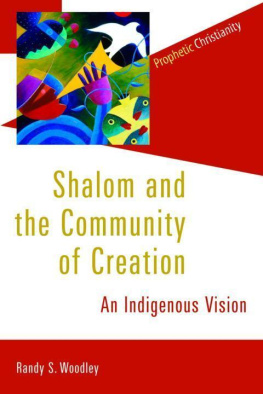
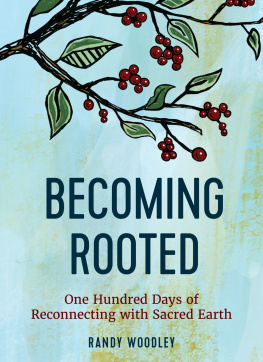

![pseud. H. G. WOODLEY - That which is Caesars. [Autobiographical reminiscences. With a portrait.].](/uploads/posts/book/447028/thumbs/pseud-h-g-woodley-that-which-is-caesar-s.jpg)
